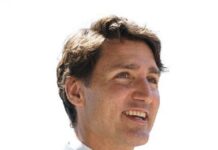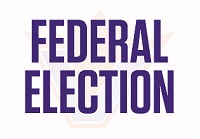
Photo by Chandra Bodalia
AS Members of Parliament get back to work in Ottawa following the summer recess, a new Ipsos Reid poll conducted for Global News has found that support for the major political parties is locked in a holding pattern, with the Liberals holding a seven-point lead over the Tories, unchanged from last month.
If an election were held tomorrow, 38% of decided voters would support the Liberal Party under Justin Trudeau (unchanged), while 31% would vote for Stephen Harper and the Conservatives (unchanged). Nearly a quarter (23%) of Canadians would support the NDP and leader Thomas Mulcair (down 1 point), while 5% nationally (up 2 points) would support the Bloc under leader Mario Beaulieu (20% in Quebec, up 5 points). Other parties, including Elizabeth May’s Green Party, would receive 3% of the vote (unchanged).
In the relatively vote-rich and competitive regions of the country that can often determine the outcome of the election, the data reveal the following:
* In Ontario, the Liberals (41%) hold a lead over the Conservatives (33%) and NDP (22%).
* In Quebec, the Liberals (36%) also lead the NDP (27%), Bloc Quebecois (20%), and the Conservatives (15%).
* In British Columbia, there is a tight three-way race between the Liberals (33%), Conservatives (32%) and NDP (30%).
ACCORDING to IPSOS, examining the overall horserace figures alone suggest that the Prime Minister’s job could be in jeopardy during the federal election in 2015, since the Liberals currently lead by seven points. Further, only one in three (33%) say that the Harper government has done a good job and deserves re-election (a figure that closely tracks with the percentage of vote the incumbent receives), up one point from February of this year, while two in three (67%) believe that ‘it is time for another federal party to take over’, down one point.
However, experience has shown that one cannot jump to hasty conclusions based on these figures alone. At the start of the most recent Ontario election campaign, only 28% of Ontarians thought that Kathleen Wynne and the Ontario Liberals deserved re-election. By the end of the campaign, that proportion increased to 39%, and the Grits pulled off a majority-government victory.
Working in the Conservative’s favour is the fact that half (49%) of Canadians ‘approve’ (11% strongly / 38% somewhat) of the performance of the Conservative government under the leadership of Prime Minister Stephen Harper, up 5 points since February. The desire for change stated above appears more superficial than a genuine disapproval of the government and its policies. The other half (51%) of Canadians ‘disapprove’ (25% strongly / 26% somewhat) of the government’s performance under Prime Minister Harper.
Despite the relatively strong approval rating for the Prime Minister and his government, when asked who would make the best Prime Minister of Canada among the three major-party leaders, Justin Trudeau (42%, unchanged) continues to best Prime Minister Harper (35%, down one point), while Thomas Mulcair trails (24%, unchanged).
Reflecting on various traits and characteristics, Canadians were asked to determine which leader was best described by each of the following (and tracked back to April 2013) – in some cases Trudeau has the upper hand, and in others Harper has the advantage.
* Someone who is best to manage during tough economic times: Harper (44%, up one point), Trudeau (31%, down three points), Mulcair (26%, up three points).
* Someone who has a vision of Canada that you can support: Trudeau (40%, down three points), Harper (35%, up two points), Mulcair (25%, up two points).
* Someone who’s values best represent my own: Trudeau (38%, down three points), Harper (35%, down two points), Mulcair (27%, up one point).
* Someone who you can trust: Trudeau (37%, down five points), Harper (33%, unchanged), Mulcair (30%, up five points).
* Someone who will get things done: Trudeau (38%, down two points), Harper (37%, up two points), Mulcair (25%, up two points).
* Someone who will best lead and represent Canada on the world stage: Harper (38%, up two points), Trudeau (38%, down five points), Mulcair (25%, up four points).
* Someone who is best to manage Canada’s foreign policy (new question): Harper (42%), Trudeau (32%), Mulcair (26%).
On the last two points concerning foreign policy and relations, it is interesting to note that while Canadians appear to believe Harper would do a better job managing Canada’s policies, they’re split on whether he or Trudeau would be best to represent them on the world stage.
Interestingly, more Canadians believe that Canada’s international reputation has worsened (37%) rather than improved (20%) since 2006, when Harper and the Conservatives took over in government. Four in ten (43%), however, believe there has been no change in how other countries view Canada.














